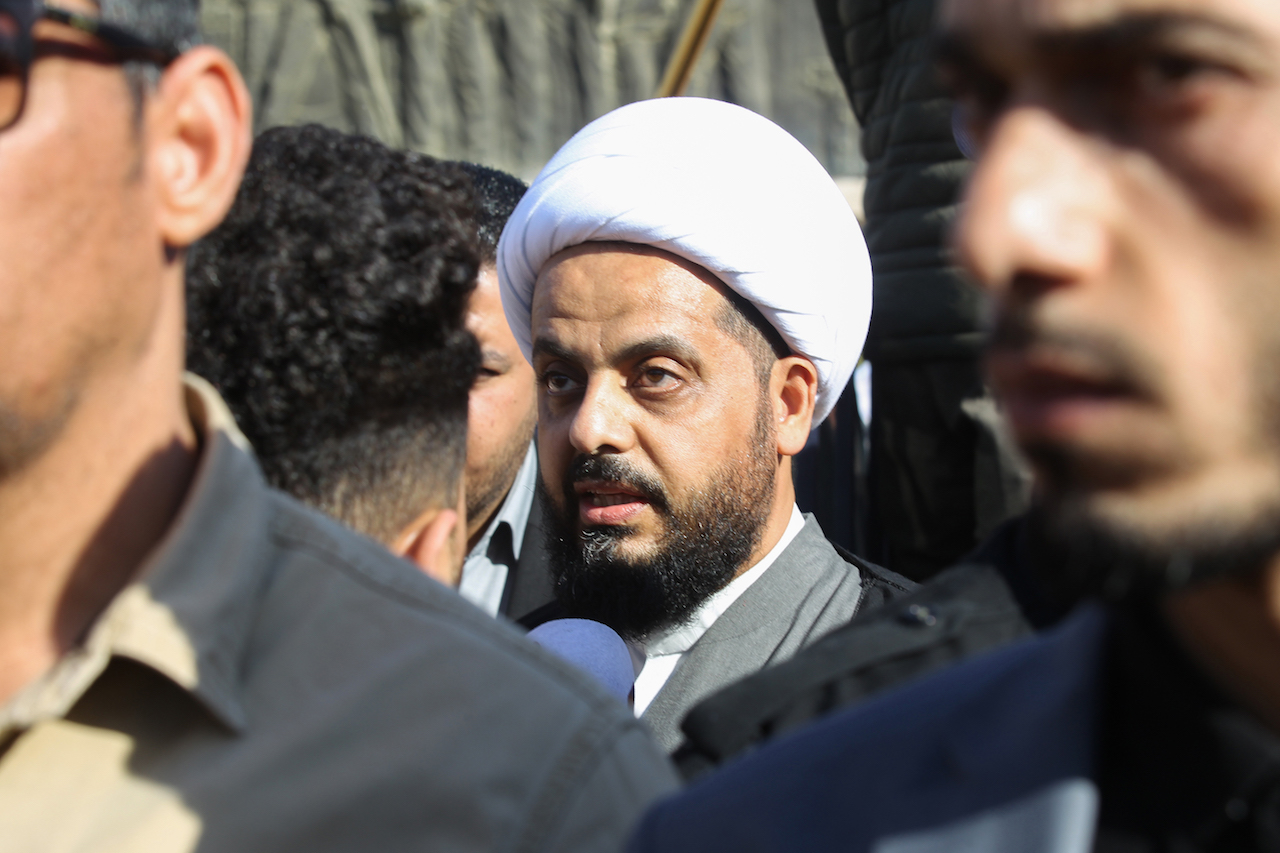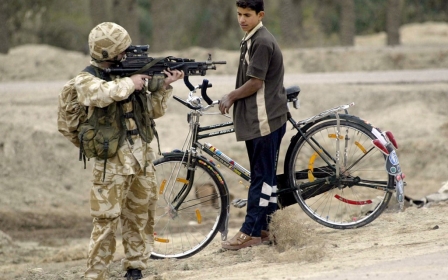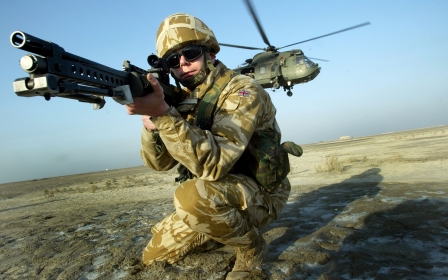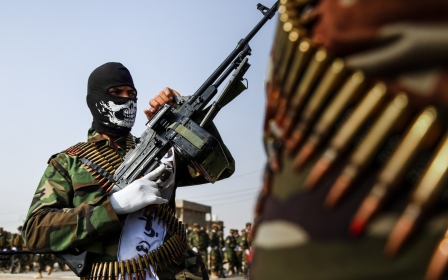EXCLUSIVE: Asaib Ahl al-Haq defying Iran to attack US in Iraq
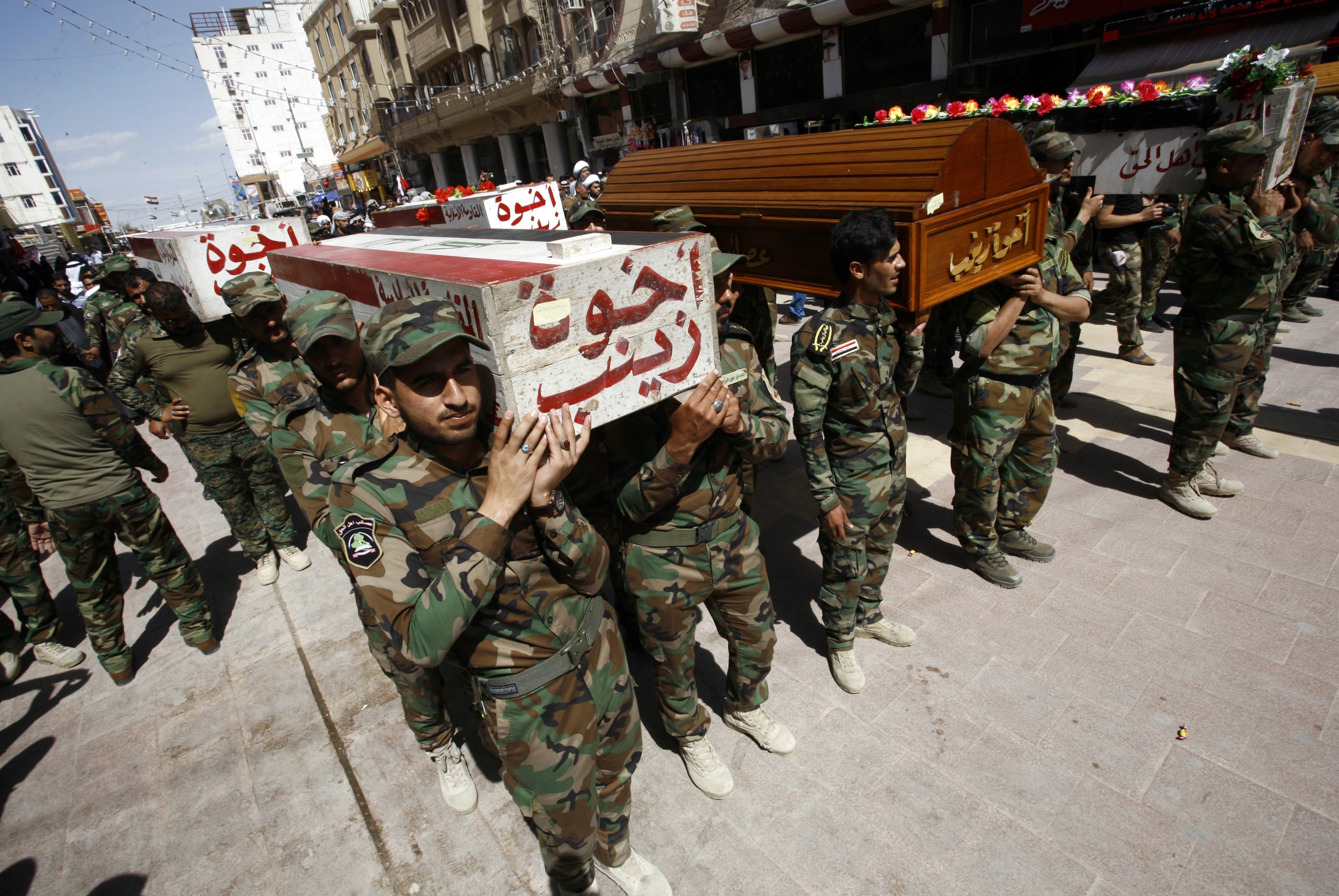
Asaib Ahl al-Haq, one of the most influential Iraqi armed factions backed by Iran, is rebelling against Tehran's orders and continuing to target US interests, Shia commanders and politicians told Middle East Eye.
In October, Iran issued orders to its armed allies in Iraq not to attack US targets, fearing the reactions of the outgoing President Donald Trump, who seeks to obstruct Iranian efforts to negotiate with his successor, Joe Biden, to return to the 2015 nuclear agreement.
Despite the explicit and strict Iranian directions, Asaib Ahl al-Haq, led by Qais al-Khazali, has carried out some attacks against the US embassy in Baghdad and American envoys over the past three weeks "without coordinating with any of the other factions or the Iranians," according to the commander of one of the armed factions.
That indicates that Asaib Ahl al-Haq is operating outside Iranian control and is therefore not relying on the protection of Tehran or other Iraqi paramilitaries, which raises many questions about the future of the faction.
On Thursday, two military convoys carrying equipment for the US forces were hit by explosive devices, causing material damage on the highwaysouthern Baghdad, security sources said.
New MEE newsletter: Jerusalem Dispatch
Sign up to get the latest insights and analysis on Israel-Palestine, alongside Turkey Unpacked and other MEE newsletters
'Asaib Ahl al-Haq's new approach has to do with preparations for the upcoming parliamentary elections and the competition to head the armed resistance factions in Iraq'
Those blasts were preceded by a missile attack targeting the US embassy in central Baghdad on 17 November, which killed a child and wounded seven others, in addition to causing material damage to a number of private properties and government buildings.
An armed group calling itself the "Qasim al-Jabareen Brigade" claimed responsibility for Thursday's attacks, while another faction calling itself "Asshab al-Kahaf" claimed responsibility for the November rocket attack.
Until recently, both groups were previously unknown. But their names have been circulated during the past few months, as they took turns claiming responsibility for attacks targeting the logistical support convoys of the US-led coalition forces in a number of governorates.
Although the finger of blame was pointed at Kataeb Hezbollah, the most influential Shia militia, commanders of four Shia armed factions, including that group and Asaib Ahl al-Haq, denied to MEE that it was involved in these attacks.
Instead, they insisted that Asaib Ahl al-Haq had carried out the attacks, putting an end to a truce with the US put forward by militias in October.
"The truce was conditional on scheduling the departure of US forces from Iraq within one month, but the Americans did not fulfill this condition and did not do anything to prove their intention to leave," a prominent Asaib Ahl al-Haq commander told MEE, speaking on condition of anonymity.
The commander said Washington's failure to make any plans to fully withdraw from Iraq meant his faction no longer needed to abide by the ceasefire.
"The religious and national duty requires everyone to stand against the foreign presence in Iraq and to use all political and military means to expel them," he said.
Surprising disobedience
Asaib Ahl al-Haq is a Shia armed faction that split from the Mahdi Army, the former armed wing of influential cleric Muqtada al-Sadr's movement, in 2006.
At first, the faction attracted fighters with experience and combat skills, and, in conjunction with Kataeb Hezbollah, carried out dozens of deadly attacks against US troops between 2006 and 2008.
Since the beginning, Asaib Ahl al-Haq has been backed, equipped and supervised by Iran, and until last month was one of the most important and powerful Iranian arms in Iraq.
Asaib Ahl al-Haq's disobedience represents a "surprise" to Shia political and armed forces.
Although Iran's reaction is not yet clear, the recent attacks, which were carried out by small groups linked to Asaib Ahl al-Haq "unilaterally and without coordination with other factions," have provoked major disputes with Kataeb Hezbollah, Asaib Ahl al-Haq's traditional partner for over a decade, and other Shia factions backed by Iran.
"Iranian officials are still pressing [the Iraqi factions] to be patient and not to carry out attacks against US interests in Iraq, because these attacks may confuse the political situation in both [Iraq and Iran]," a prominent Shia politician close to Iran, who declined to be named, told MEE.
According to the politician, Asaib Ahl al-Haq is the most prominent of Iraqi factions unhappy with Iranian directives and starting to revolt. In a recent meeting with Shia leaders, he said, Asaib Ahl al-Haq said "the situation in Iraq is special and that they are not bound by the Iranian viewpoint and will not submit to the Iranian will".
"Kataeb is more committed to Iranian directives, and their fighters are more disciplined, and they see that it is necessary to not confuse the Iraqi scene with any unpredictable behaviour, so they were against these attacks from the beginning," the politician said.
"Asaib Ahl al-Haq seeks to reproduce its media and political discourse and to perpetuate the idea of their national belonging and their non-affiliation with Iran. Asaib Ahl al-Haq's new approach has to do with preparations for the upcoming parliamentary elections and the competition to head the armed resistance factions in Iraq."
An outbreak of fighting between Asaib Ahl al-Haq and Kataeb Hezbollah "is not currently expected" according to the factions' commanders. But Asaib Ahl al-Haq's insistence to continue its new approach will necessarily mean that Iran may exclude it, sacrifice it and leave it to confront the Americans and the Iraqi government alone.
"All scenarios are possible. What will happen with Asaib Ahl al-Haq depends on what the Iranians decide. It is expected that Iran will seek to bring them back to its bosom and will try to limit [Qais] al-Khazali's ambitions or satisfy him with some settlement," a Kataeb Hezbollah commander told MEE, referring to Asaib Ahl al-Haq's leader.
"But will they succeed in this? No one knows except Khazali and the Iranians."
Middle East Eye delivers independent and unrivalled coverage and analysis of the Middle East, North Africa and beyond. To learn more about republishing this content and the associated fees, please fill out this form. More about MEE can be found here.


